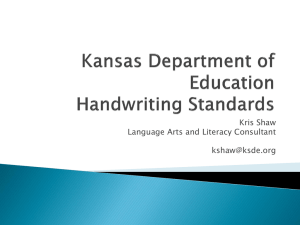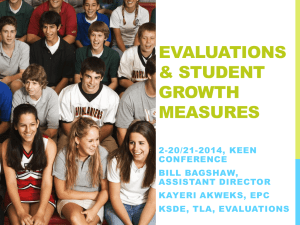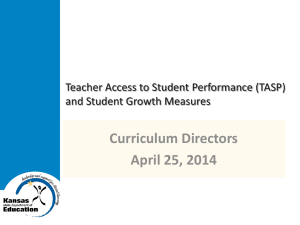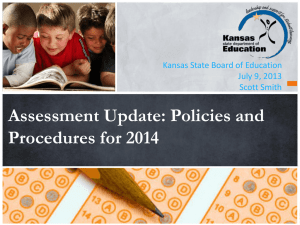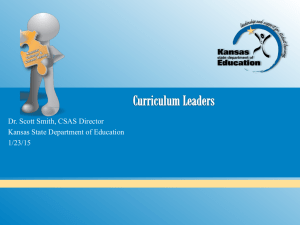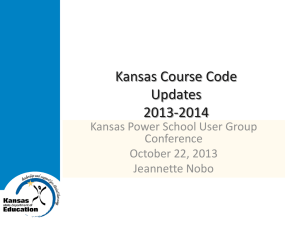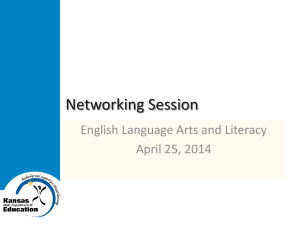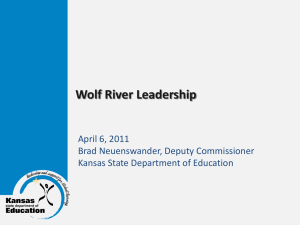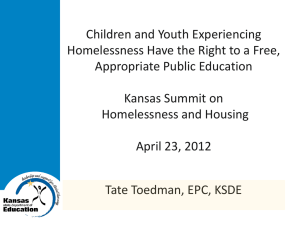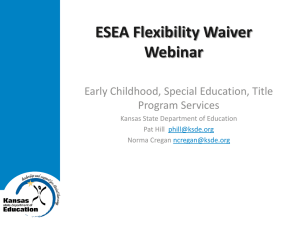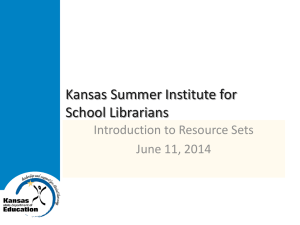Assessment Update - Kansas State Department of Education
advertisement
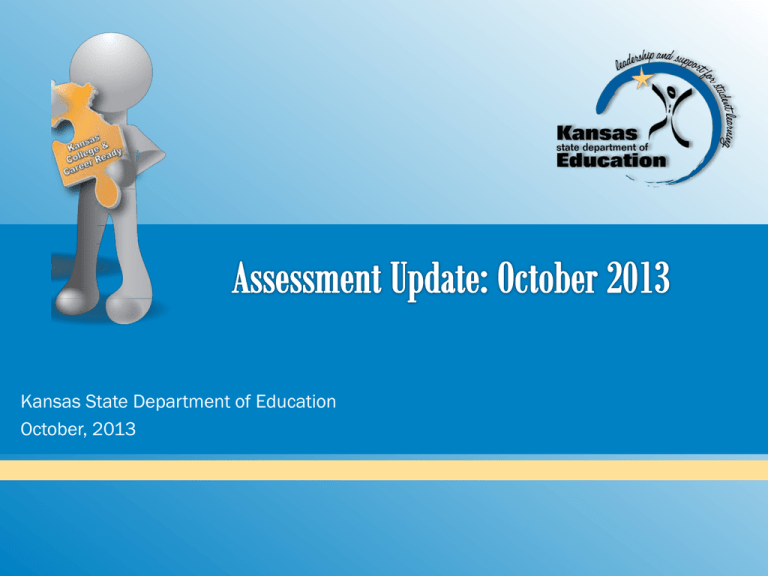
Kansas State Department of Education October, 2013 Spring 2014 Smarter Balanced Assessment Field Test: KSDE will be sending to all buildings and districts a web registration link and asking that schools who are interested in volunteering for the SBAC field test volunteer by responding to the questions on the link. An entire grade level or levels within a building must be volunteered. Volunteering does not guarantee that schools will be chosen. The SBAC Consortium will map volunteered grade levels against the its pre-designed sample needs. Those grade levels from buildings that meet the sample requirements will be chosen; those that do not meet the sample needs will not be chosen and notified accordingly. Obviously, the needs of the sample will not be met by only volunteer buildings. SBAC will be contacting directly buildings needed to fill the gaps. Kansas State Department of Education www.ksde.org Desired (i.e., Goal) SBAC Field Test Numbers: Grades 3-8: average of 2,500 students in each ELA/Math Grades 9-10: average 730 students in each ELA/Math Grade 11: 7,063 ELA and 8,805 Math Total Kansas Students: 25,000 ELA; 28,000 Math Kansas Students will comprise approximately 2.8% of the total SBAC sample. Kansas State Department of Education www.ksde.org What if I participate in the Field Test? KSDE has no intention of requiring any building taking the Field Test to also take the transitional state assessment. KSDE will not, however, receive a response for the double-testing waiver until December. Reporting scores for students taking the field test will be done at CETE. KSDE will be consulting the field when finalizing developing policy on how to handle the AMOs in 2014 for buildings that participated in the field test. Those building will be missing scores for entire grade levels. It’s important for Kansas students to be part of the cut-score setting process. Kansas State Department of Education www.ksde.org Stakeholder Update The Kansas College and Career Ready Assessment Advisory Committee (KCCRAAC) met on August 6 and provided input for a statewide summative assessment in mathematics and English language arts that meets both the needs of Kansas students and the requirements of the U.S. Department of Education. Kansas State Department of Education www.ksde.org What role does a summative assessment play relative to the definition of College and Career Readiness? Kansas State Department of Education www.ksde.org The August 6th meeting established the following with regard to a summative state assessment: Should meet the Kansas definition of College and Career Ready. Should be geared toward helping students obtain postsecondary readiness and job-market skills. Should be focused on students. Should assess all students. Should be meaningful and motivational to students. Districts should have options for a vetted/benchmarked assessment. Kansas State Department of Education www.ksde.org A subset of the KCCRAAC met again August 28 to draft a plan based on conversations from the August 6 meeting . The group identified four possible paths forward: 1. Smarter Balanced Assessment Consortium for 3-8 and H.S. (CETE will score, administer, and report) 2. Assessment Vendor, e.g. ACT for 3-8 and H.S. 3. Hybrid Assessment Model (i.e., the state will provide a default assessment and allow districts if they so choose to use another USED approved assessment funded by the district) 4. CETE-developed Assessment for 3-8 and H.S Kansas State Department of Education www.ksde.org A final meeting was held on September 3rd during which #3 was chosen as a path to pursue: 1. Smarter Balanced Assessment Consortium for 3-8 and H.S. 2. Assessment Vendor, e.g. ACT for 3-8 and H.S. 3. Hybrid Assessment Model (i.e., the state will provide a default assessment free and allow districts if they so choose to use another USED approved assessment funded by the district for ) 4. CETE-developed Assessment for 3-8 and H.S. Kansas State Department of Education www.ksde.org CETE Transitional Assessment All students except those participating in the SBAC field test will be taking the CETE transitional assessment in the Spring of 2014: --The CETE test is written to the SBAC test blueprint. --The test will use technology-enhanced items but no performance items. -- Cut scores will be set in the summer of 2014 and will be used only for the 2014 Transitional Assessment. SBAC will use separate cut scores in 2015 Kansas State Department of Education www.ksde.org Each of the four assessment scenarios above will involve use of the CETE “Transitional Assessment” administered in 2014, whether (1) as an Interim Assessment that predicts performance on a Collegeand-Career-Ready Assessment, or (2) as a final summative assessment. The KSDE and CETE are asking, therefore, that districts consider assessing in the spring of 2014 10th grade students, 11th grade students, and 12th grade students on the CETE 2014 “Transitional Assessment.” Assessing these high school grade levels in 2014 will assist schools with the following: Kansas State Department of Education www.ksde.org Providing districts with feedback on student progress on the College-and-Career-Ready Standards. Providing juniors and seniors with insight into College-and-Career-Ready academic expectations. Providing sophomores with an advance look at academic expectations for the 2015 assessments. Providing CETE high school assessment data necessary for improving the predictive ability of College-and-Career ready Assessments offered in 2015. Kansas State Department of Education www.ksde.org Assessments in 2014 and Beyond … 2014 will be the last year for the “old” science assessment. Pilots of new science items will occur in 2015 and 2016 with a new NGSS Assessment planned for 2017. CETE will be piloting items for the HistoryGovernment Assessment in the Spring of 2014. Kansas State Department of Education www.ksde.org KSDE Assessment Preconference, November 3rd at the Hyatt Regency-Century II, Wichita, KS. Topics covered: Next Generation of Assessments, Keynote CETE presentation on the 2014 Transitional Assessment Accessibility issues for Next-Generation Assessments What’s New: KITE Test Engine and Ipads What is the Personal Needs profile of “PNP” History-Government Update NGSS Science Assessment Update Dynamic Learning Maps Update Kansas State Department of Education www.ksde.org Curriculum Leaders Meeting October 11, 2013 General CTE assessment Specific Pathway assessments: • • • • • • • • • Comprehensive Agriculture Animal Systems Plant Systems Design & Pre-construction Manufacturing (Production) Comprehensive Business Finance Marketing Education/Training Assesses students’ knowledge/skills in the following areas: 1. Academic Foundations • Reading and Math aligned with KCCRS • Scientific Reasoning 2. Information and Communication 3. Collaboration and Teamwork 4. Safety, Health, and Environment 5. Leadership 6. Employability and Career Development http://careerpathways.us/public/blueprints.html Item Types • • • • Multiple Choice Technology Enhanced Sit-down, computerized assessment Situational Judgment Performance Tasks (still under construction) Testing Window – October 25 through April 4 Students eligible for the General CTE Assessment • Juniors and Seniors who have completed or are currently enrolled in a technical level course Schools must download the KITE system to deliver cPass assessments. Here’s how……….. http://ksassessments.org/requirements 2013-2014 Field Test of computerized assessment 2014-2015 Full assessment with performance tasks 2015-2016 Summative assessment with a College & Career Ready benchmark Specifically assessing students’ technical skills in Agriculture Testing Window – October 25 through April 4 Students eligible for the Comprehensive Agriculture Assessment: • Juniors and Seniors who have completed at least 2 Agriculture courses Jay Scott Career & Technical Education jscott@ksde.org Curriculum Coordinators Meeting October 11, 2013 2013-2014 Piloted Items (There will be no HGSS assessment in 2014) 2014-2015 Field Test 2015-2016 Full Blown Assessment (Grades 6, 8. and HS either World or U.S. History) You mean we don’t have to give the HGSS assessment next spring? On-line Assessment including performance tasks Year round access Digital video, audio and text libraries tied to units of study Student choice of standard, content and prompt for the constructed response Are you telling us what documents we have to use? “Visible thinking” graphic organizer that ask student to categorize information Document analysis over sourcing, context, and content Constructed responses addressing the benchmarks There will be machine and hand scored items Work product will be banked not just the score You mean that I have to grade all of those performance tasks? Kansas State Department of Education www.ksde.org

